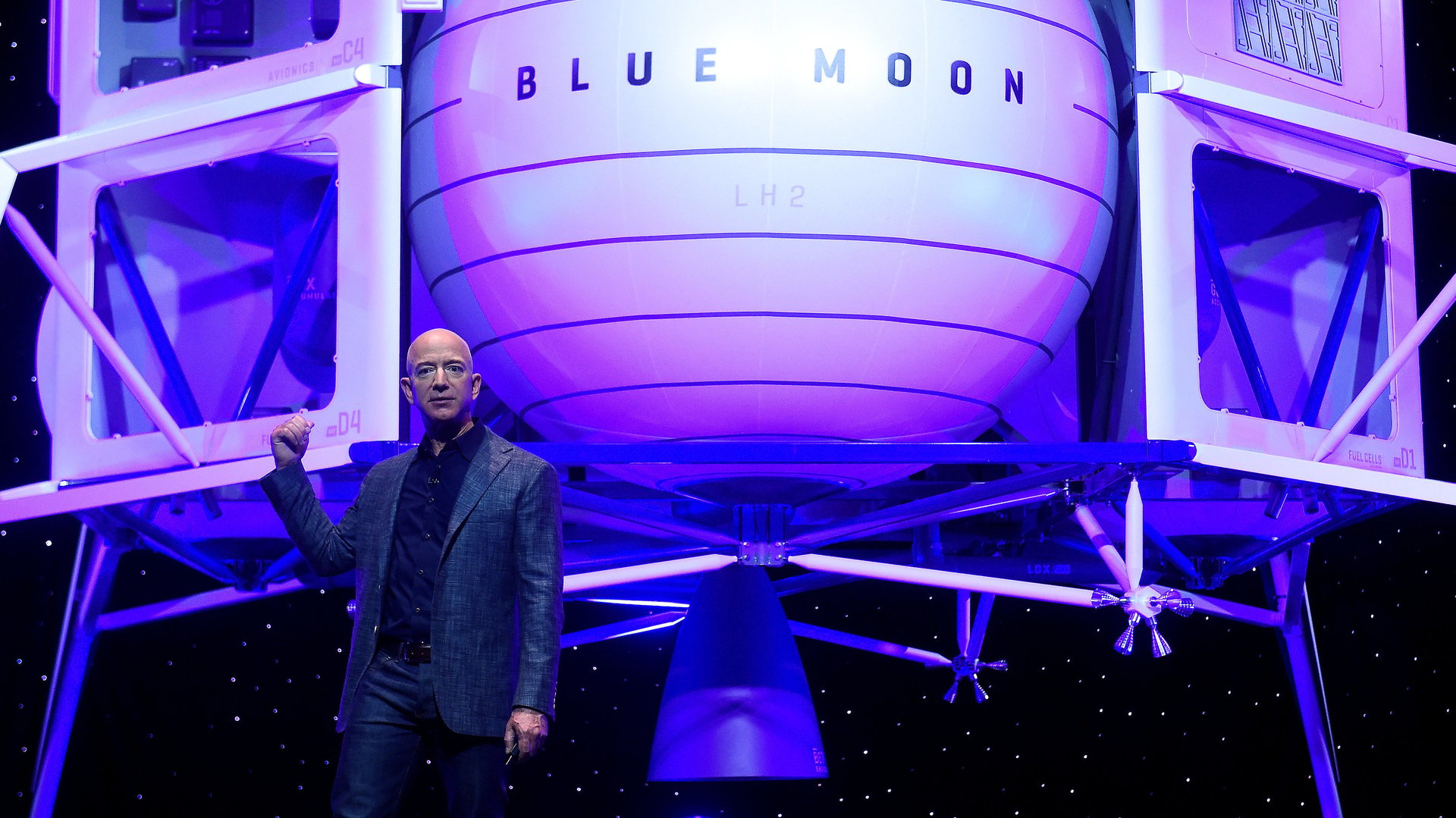Jeff Bezos has built a team to take astronauts back to the moon
Jeff Bezos has put his space company Blue Origin in prime position to land on the moon—quite literally.


Jeff Bezos has put his space company Blue Origin in prime position to land on the moon—quite literally.
The Amazon founder announced on Tuesday that he had assembled a national consortium, with Blue as the prime contractor and including aerospace giants Lockheed Martin and Northrop Grumman, as well as the space tech firm Draper, which was spun out of MIT to launch the original Apollo moon missions.
“This is the only way to go back to the moon fast,” Bezos said on Tuesday during a speech at the International Astronautical Congress, the world’s biggest space conference, in Washington, DC. “We’re not going back to the moon to visit, we’re going back to the moon to stay.”
Space programs around the world are coalescing around a return to the moon to explore newly-detected resources like liquid water, delve into the history of the solar system, and gather new astronomical data on the far side of Earth’s largest satellite. NASA’s Artemis program is aiming to reach the moon by 2024, and NASA administrator Jim Bridenstine has said he wants to hire private firms to build the spacecraft that will carry astronauts to its surface from a to-be-launched orbiting way station called the Lunar Gateway.
In May, Bezos revealed the design for his company’s lunar lander, and endorsed NASA’s Artemis program as a wise priority for space exploration. Blue’s lander design was expected to compete with offerings from Lockheed, the most prolific builder of spacecraft that can land on other planets, and aerospace giant Boeing. Boeing and Lockheed are already building, respectively, a rocket called the Space Launch System and spacecraft called Orion to carry astronauts from Earth to the Lunar Gateway.
Recruiting Lockheed to its team adds a big advantage to Blue’s bid, but it’s still not clear if NASA will have enough money to meet the Trump administration’s 2024 landing goal. Congress’ unfinished spending plans for next year now fund only about 40% of the space agency’s requested downpayment for the Artemis program. And NASA won’t even be able to say how much the entire program will cost until next year.
Bezos is one of a number of Silicon Valley figures who believe that space business can be the next big technology opportunity, but only if the cost of getting to orbit comes down enough to incentivize internet-style entrepreneurship.
“You cannot start an important space company in your dorm room today,” Amazon founder Jeff Bezos said this morning. “The reason that is impossible is the price of admission is too high. We need more of the infrastructure to be deployed.”
Both Bezos and Elon Musk, who founded the leading US rocket-maker, SpaceX, believe that reusable rockets are key to this vision. But they diverge on the best strategy to make it a reality. SpaceX has held itself apart from traditional space companies, insisting on fixed-price contracts, competition, and performing tests in public, while Blue Origin has been more secretive and willing to partner with traditional firms like United Launch Alliance or Lockheed.
SpaceX is pinning its deep space hopes on its Starship and Super Heavy Booster, which Musk says will be capable of flying to the moon—or Mars—directly. “We want to land it on the moon by 2022,” SpaceX president Gwynne Shotwell said today, calling that an “aspirational timeframe.” SpaceX executives say they expect their Falcon rockets will play a role in delivering robots and supplies for Artemis.
“The way NASA traditionally does things is much slower and more deliberate … [SpaceX] is much more of a Silicon Valley approach, less of a government approach,” NASA administrator Bridenstine said on Monday.
Bezos’ team—at 2,000 people, less than half the size of SpaceX—has positioned itself at the center of NASA’s plans. That brings the risks of bureaucratic delay and changing policies, but also the benefits of the powerful inertia and resources of the US space program. But the relatively unproven space company’s role as the team leader also signals a changing of the guard in the space industry.
“We felt that such an ambitious mission called for a new approach and a team effort,” Gary Napier, a Lockheed Martin spokesperson, told Quartz. “With the recent NASA award to produce six more Orion spacecraft missions, Lockheed Martin can leverage Orion technology, experience and supply chain to provide the safest Crew Module for Artemis.”